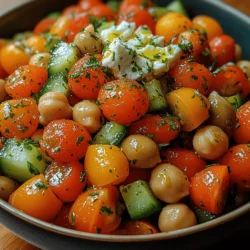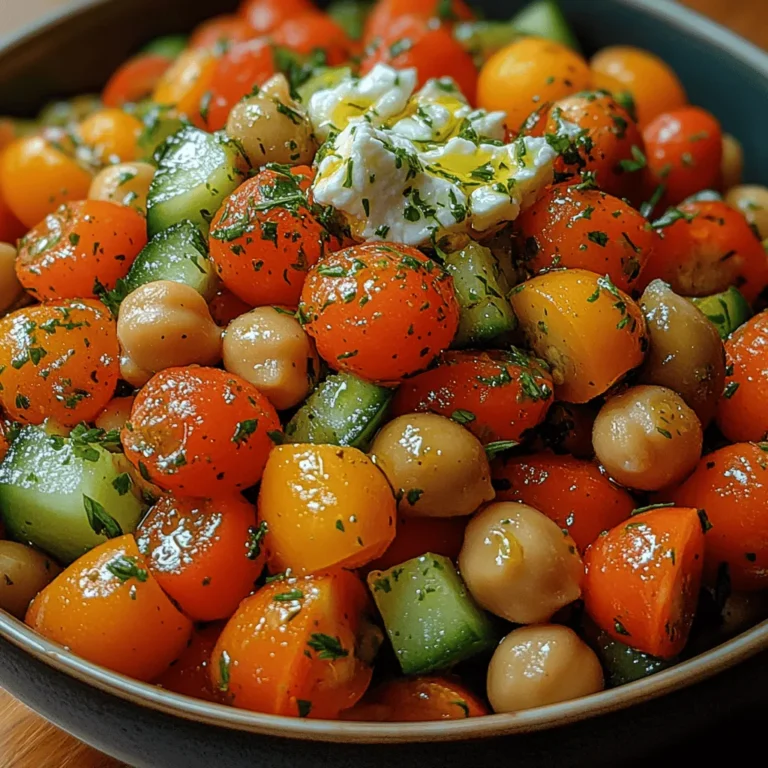Mediterranean Bliss: Healthy Greek Chickpea Salad
Exploring the vibrant flavors of Mediterranean cuisine, the Healthy Greek Chickpea Salad is a delightful blend of fresh ingredients that not only tantalizes the taste buds but also nourishes the body. This salad is a celebration of color, taste, and texture, making it an ideal choice for anyone looking to enjoy a nutritious meal. Packed with protein, fiber, and an array of vitamins, this dish is perfect for a light lunch, a side dish at dinner, or a healthy snack. The combination of chickpeas, fresh vegetables, olives, and feta cheese creates a well-rounded dish that is as satisfying as it is healthy.
In this article, we will delve into the origins of this classic dish, highlight the key health benefits of its ingredients, and provide a step-by-step guide to creating this delicious salad at home. By understanding the roots of Mediterranean cuisine and the healthful properties of its components, you can appreciate why this salad has become a favorite among health-conscious eaters.
Understanding the Mediterranean Diet
The Mediterranean diet is more than just a way of eating; it’s a lifestyle that emphasizes the consumption of fresh, seasonal, and locally sourced ingredients. This diet is primarily based on the traditional cuisines of countries bordering the Mediterranean Sea, such as Greece, Italy, and Spain. It promotes whole foods, including fruits, vegetables, whole grains, legumes, nuts, and healthy fats, particularly olive oil.
Research has shown that following the Mediterranean diet can lead to numerous health benefits, including improved heart health, weight management, and reduced risk of chronic diseases. The diet’s focus on plant-based foods and healthy fats also supports overall well-being, making it a sustainable choice for many individuals. Incorporating fresh ingredients, such as those found in the Healthy Greek Chickpea Salad, aligns perfectly with the principles of the Mediterranean diet, offering nourishment for both the body and soul.
Key Ingredients of the Greek Chickpea Salad
At the heart of the Greek Chickpea Salad are its key ingredients, each contributing unique flavors and nutritional benefits. Understanding these components will not only enhance your appreciation of this dish but also inspire you to explore the versatility of Mediterranean cooking.
Overview of Chickpeas
Chickpeas, also known as garbanzo beans, are a staple in Mediterranean cuisine and form the foundation of this salad. These legumes are packed with protein, fiber, and essential vitamins and minerals, making them an excellent choice for anyone seeking a nutrient-dense food. They are particularly rich in folate, iron, and magnesium, which are vital for maintaining energy levels, supporting immune function, and promoting overall health.
The versatility of chickpeas is another reason for their popularity. They can be used in a variety of dishes, from soups and stews to salads and dips, such as the renowned hummus. Their hearty texture makes them a satisfying addition to meals, helping to keep you full and energized throughout the day.
Highlighting Fresh Vegetables
Fresh vegetables are a hallmark of Mediterranean cuisine, and they play a crucial role in the Greek Chickpea Salad. The primary vegetables used in this recipe include cherry tomatoes, cucumbers, bell peppers, and red onions. Each of these ingredients not only adds a burst of color but also brings a range of nutritional benefits to the dish.
– Cherry Tomatoes: These bite-sized tomatoes are rich in antioxidants, particularly lycopene, which has been linked to various health benefits, including reduced risk of certain cancers and heart disease. They also provide a refreshing sweetness that balances the salad’s savory elements.
– Cucumbers: Low in calories and high in water content, cucumbers are excellent for hydration and digestive health. They are also a good source of vitamins K and C, which contribute to bone health and immune function, respectively.
– Bell Peppers: Available in various colors, bell peppers are high in vitamins A and C, and they provide a crunchy texture that enhances the salad. Their bright colors also signify the presence of different phytonutrients that can support overall health.
– Red Onions: Known for their distinctive flavor, red onions are rich in antioxidants and sulfur compounds that can promote heart health. Their sharp taste adds depth to the salad, balancing the sweetness of the tomatoes and the crunchiness of the cucumbers.
The Role of Olives and Feta Cheese
No Greek salad is complete without the addition of olives and feta cheese, both of which add distinct flavors and textures to the dish.
– Kalamata Olives: These dark purple olives are known for their rich, fruity flavor and are high in healthy monounsaturated fats. They also contain antioxidants and anti-inflammatory properties that can benefit cardiovascular health. The brininess of Kalamata olives enhances the overall taste of the salad, making it a true Mediterranean delight.
– Feta Cheese: While optional, feta cheese is a traditional ingredient that adds creaminess and tang to the salad. Made from sheep’s or goat’s milk, feta is lower in fat than many other cheeses and provides a source of calcium and protein. Its crumbly texture makes it easy to incorporate into salads without overwhelming the other ingredients.
Herbs and Spices: Enhancing Flavor and Nutrition
Herbs and spices are essential components in Mediterranean cooking, and they play a significant role in elevating the flavors of the Greek Chickpea Salad.
– Parsley and Dill: Fresh parsley adds a bright, herbaceous note that complements the other ingredients beautifully. Dill, with its delicate anise-like flavor, enhances the freshness of the salad and is often used in Mediterranean dishes to add complexity.
– Oregano: This fragrant herb is a staple in Mediterranean cuisine, known for its earthy flavor and numerous health benefits. Oregano is rich in antioxidants and has been used for its antibacterial properties. It pairs perfectly with the other ingredients, providing a subtle depth that ties the dish together.
Step-by-Step Recipe for Mediterranean Bliss: Healthy Greek Chickpea Salad
Now that we have explored the origins and key ingredients of the Greek Chickpea Salad, let’s dive into the step-by-step process of preparing this nutritious dish.
Preparing the Vegetables
The first step in creating your Healthy Greek Chickpea Salad is to prepare the fresh vegetables. Begin by thoroughly washing all your produce. This is particularly important for items like cucumbers and cherry tomatoes, which can harbor dirt and pesticides. After washing, take the time to chop the vegetables into uniform pieces. This not only enhances the visual appeal of the salad but also ensures even mixing and distribution of flavors.
For the cucumbers, remove the skin if desired for a softer texture, then slice them in half lengthwise and chop into bite-sized pieces. Halve the cherry tomatoes and thinly slice the red onions. When cutting bell peppers, remove the seeds and core before chopping them into small, manageable pieces.
Mixing the Salad Base
Once your vegetables are prepped, it’s time to combine them with the chickpeas. For this recipe, you can use canned chickpeas for convenience, but if you prefer, you can cook dried chickpeas for an even fresher taste. Rinse the chickpeas under cold water to remove excess sodium and any canning liquid.
In a large mixing bowl, gently combine the chickpeas with the chopped vegetables. Be careful during this process to maintain the integrity of the chickpeas, as they can easily become mushy if overmixed. Aim for a light toss to ensure all ingredients are evenly distributed.
Incorporating Feta and Herbs
The final step in your preparation involves adding the feta cheese and fresh herbs. If you are using feta, crumble it into small pieces and fold it into the salad gently. The goal is to distribute the feta without mashing it into the other ingredients, which can affect the overall texture of the salad.
Next, sprinkle in the fresh parsley, dill, and oregano. Again, be gentle as you mix these in to maintain the vibrant colors and textures of your Mediterranean Chickpea Salad.
With the vegetables, chickpeas, feta, and herbs beautifully combined, you are well on your way to enjoying a dish that embodies the essence of Mediterranean cuisine. Stay tuned for the next part of this article, where we will explore the dressing that will bring this salad to life, as well as tips for serving and storing your creation.
{{image_2}}
Benefits of Fresh Herbs in the Salad
Fresh herbs play an essential role in enhancing the flavor profile of your Greek Chickpea Salad. Not only do they add vibrant colors and aromatic fragrances, but they also contribute numerous health benefits.
Flavor Enhancement
Herbs such as parsley, cilantro, and mint provide a burst of freshness that elevates the overall taste of the salad. Their distinct flavors complement the earthy chickpeas and the tangy dressing, creating a harmonious balance that is characteristic of Mediterranean cuisine.
Nutritional Value
Fresh herbs are low in calories and rich in antioxidants, vitamins, and minerals. For instance:
– Parsley is known for its high vitamin K content, which is vital for bone health.
– Mint can aid in digestion and has been linked to improved memory function.
– Cilantro is rich in vitamins A and K, as well as essential oils that may help detoxify the body.
Incorporating these herbs not only enhances the salad’s flavor but also boosts its nutritional profile, making this dish a true powerhouse of health benefits.
Creating the Dressing
The dressing is a crucial component that binds the flavors of the Greek Chickpea Salad together. A well-prepared dressing can elevate the salad from ordinary to extraordinary.
Ingredients Needed for the Dressing
To craft a delightful dressing that complements your salad, gather the following ingredients:
– 1/4 cup extra virgin olive oil
– 2 tablespoons red wine vinegar
– 1 tablespoon lemon juice (freshly squeezed)
– 1 teaspoon Dijon mustard
– 1 garlic clove, finely minced
– Salt and pepper to taste
Step-by-Step Preparation of the Dressing
1. Combine the Ingredients: In a small bowl or a mason jar, add the extra virgin olive oil, red wine vinegar, lemon juice, Dijon mustard, and minced garlic.
2. Whisk or Shake: If using a bowl, whisk the ingredients vigorously until they are well blended. If using a mason jar, secure the lid and shake it until the dressing is emulsified.
3. Season to Taste: Add salt and pepper according to your preference. Taste the dressing, and adjust the acidity or seasoning as needed. You can add more lemon juice for sharpness or more olive oil for richness.
4. Let it Rest: Allow the dressing to sit for at least 15 minutes before using. This resting period allows the flavors to meld beautifully.
Combining and Tossing the Salad
Now that your dressing is prepared, it’s time to assemble your Greek Chickpea Salad.
Proper Techniques for Tossing the Salad
1. Layer the Ingredients: In a large mixing bowl, start by adding the chickpeas, diced cucumber, cherry tomatoes, red onion, bell pepper, olives, and fresh herbs.
2. Drizzle the Dressing: Pour the prepared dressing over the salad ingredients.
3. Gently Toss: Use a large spoon or salad tongs to gently toss the salad. Start from the bottom and lift the ingredients up to ensure that everything is coated evenly with the dressing.
Ensuring Even Distribution of Flavors
Tossing the salad properly is essential for even flavor distribution. Take your time with this step, ensuring that the dressing coats all ingredients. If you notice that some ingredients are sticking together, you can use your fingers to break them apart gently as you mix.
Chilling the Salad
Chilling your salad can significantly enhance its flavor, allowing the ingredients to meld together beautifully.
Why Chilling Enhances Flavor
When you chill your salad, the cold temperature helps to intensify the flavors. The dressing seeps into the chickpeas and vegetables, allowing for a more cohesive taste. Additionally, the fresh herbs become more aromatic when allowed to sit in the dressing for a while.
Recommended Chilling Time for Optimal Taste
For the best results, cover the salad and place it in the refrigerator for at least 30 minutes before serving. If you have time, let it chill for up to 2 hours. This will make a noticeable difference in flavor and texture when served.
Serving Suggestions
Presentation plays a key role in how appetizing your dish appears.
Presentation Ideas for an Appealing Dish
1. Colorful Layering: Serve your salad in a clear bowl to showcase its vibrant colors. Layer the ingredients to create a visually appealing presentation.
2. Garnish: Add a sprinkle of feta cheese or a few extra herbs on top before serving for a pop of color and added flavor.
3. Individual Servings: For a more elegant presentation, consider serving the salad in individual bowls or jars. This not only looks beautiful but also makes it easy for guests to enjoy.
Pairing the Salad with Proteins or Other Dishes
This Greek Chickpea Salad pairs wonderfully with various proteins and dishes. Here are a few ideas:
– Grilled Chicken: The savory flavor of grilled chicken complements the salad perfectly.
– Fish: A light, grilled fish like salmon or tilapia pairs well, enhancing the Mediterranean theme.
– Pita Bread: Serve with warm pita for a delightful crunch and a complete meal.
Health Benefits of the Greek Chickpea Salad
This salad isn’t just delicious; it’s also incredibly nutritious.
Nutritional Analysis
– Caloric Breakdown: A serving of Greek Chickpea Salad (approximately 1 cup) contains about 250 calories.
– Macro-Nutrient Overview: Each serving typically offers around 10 grams of protein, 12 grams of healthy fats (primarily from olive oil), and 30 grams of carbohydrates.
Vitamins and Minerals Present in the Salad
This salad is packed with essential nutrients, including:
– Fiber: Beneficial for digestion and maintaining a healthy gut.
– Iron: From chickpeas, which is vital for blood health.
– Vitamin C: Found in cucumbers and tomatoes, which supports the immune system.
The Benefits of a Plant-Based Diet
Incorporating more plant-based meals into your diet is essential for maintaining optimal health.
Why Plant-Based Meals Are Essential for Health
A plant-based diet has been linked to numerous health benefits, including lower blood pressure, reduced risk of heart disease, and better weight management. By focusing on whole foods, you can reduce your intake of processed foods, which often contain unhealthy fats, sugars, and additives.
How This Salad Fits Into a Balanced Diet
The Greek Chickpea Salad is an excellent representation of a balanced meal. It’s rich in plant proteins, healthy fats, and fiber, making it a satisfying and nutritious option. Pair it with whole grains such as quinoa or brown rice for a complete meal.
Cultural Significance of the Dish
Greek salad is more than just a dish; it carries a rich history and cultural significance.
The Origins of Greek Salad
Greek salad, known as “Horiatiki,” originates from the rural villages of Greece. Traditionally made with simple ingredients available in local gardens, it reflects the Mediterranean lifestyle that emphasizes fresh, seasonal produce.
Exploring the History and Cultural Importance
Historically, Greek salad was enjoyed as a light meal during the warm summer months, showcasing the simplicity and freshness of Mediterranean cuisine. It represents the idea of communal dining, often served as part of a larger meal shared among family and friends.
Variations of the Dish Across the Mediterranean Region
Throughout the Mediterranean, variations of Greek salad exist. For instance, in Italy, you might find a similar salad with added capers and mozzarella. In Turkey, a similar dish called “Çoban Salatası” includes different herbs and spices, showcasing the diverse culinary traditions of the region.
Conclusion
The Mediterranean Bliss: Healthy Greek Chickpea Salad is a delightful blend of flavors, colors, and textures that embodies the essence of Mediterranean cuisine. With its numerous health benefits, ease of preparation, and versatility, this salad can easily become a staple in your meal rotation.
Whether you’re enjoying it on its own, pairing it with grilled meats, or serving it as part of a larger spread, this salad is sure to impress. Embrace the vibrant flavors and health benefits of Mediterranean cuisine, and discover how it can contribute to a healthier lifestyle. Explore this refreshing dish today and enjoy the many benefits it offers!


